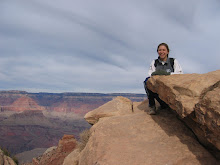Intercultural perceptions
My legs are beginning to catch the beat of Buenos Aires. From the quiet Flagstaff neighborhood where I lived a routine of fruit, veggie, whole grain diet; fresh air hikes; early to bed and early to rise… to 10pm dinners of filet mignon; constant lively discussion over cafe con leche; pounding the exhaust filled streets of this vibrant metropolis.
Perhaps the description I heard most of Argentineans before arriving was that regarding their national pride, and I’m entertained to find this generalization largely true. Several people I’ve met have taken much time to describe how Argentina outshines other South American countries in terms of their ties to Europe, the beauty and variety of its natural wonders, and its resiliency. I was surprised to find an especially abrupt air towards Chileans. Another minute example gave me a chuckle this evening as my host brother, Agustín, corrected my Spanish homework. I had written about my experience this weekend at Carnaval (not much to speak of… we were “attacked” by shaving cream, as is the tradition), I suggested that one might consider going to Carnaval in Gualeguaychú (in the province of Entre Ríos, Argentina), or Brasil. That “or Brazil” addition caught the attention of Agustín who insisted that the option of going to Brazil not be included. I chuckled and raised little resistance as he backspaced it away.
Several Argentineans have asked me what ideas Americans have of this country, and I ask them the same in return of Argentineans’ impressions of the United States. I find this interesting, so I’ll share… Among the impressions are: that the average U.S. family is not as solid as that of a Latin American family, and children are expected to leave the house at 18 years old; that people from the States are feverishly in quest of the mighty dollar and work like crazy to acquire wealth; and that Americans know and care little about the world at large. My policeman friend explained that Argentineans feel frustration toward President Bush for his arrogance in intervening unilaterally on the global stage. He articulated his understanding that many U.S. citizens are not in agreement with this administration’s policies, and that each country consists of people that contribute both positively and negatively to the world. At the same time, he explained, if he were to tell his friends that he was talking with a woman from the U.S., some might react abruptly with “Why would you talk with a Yankee?” I get the impression that this response would be rare, however, and overall I have felt very well received. In general, the level global awareness and development of ideas here has impressed me in this sense. No doubt this offers a rich environment in which to study international relations.
Perhaps the description I heard most of Argentineans before arriving was that regarding their national pride, and I’m entertained to find this generalization largely true. Several people I’ve met have taken much time to describe how Argentina outshines other South American countries in terms of their ties to Europe, the beauty and variety of its natural wonders, and its resiliency. I was surprised to find an especially abrupt air towards Chileans. Another minute example gave me a chuckle this evening as my host brother, Agustín, corrected my Spanish homework. I had written about my experience this weekend at Carnaval (not much to speak of… we were “attacked” by shaving cream, as is the tradition), I suggested that one might consider going to Carnaval in Gualeguaychú (in the province of Entre Ríos, Argentina), or Brasil. That “or Brazil” addition caught the attention of Agustín who insisted that the option of going to Brazil not be included. I chuckled and raised little resistance as he backspaced it away.
Several Argentineans have asked me what ideas Americans have of this country, and I ask them the same in return of Argentineans’ impressions of the United States. I find this interesting, so I’ll share… Among the impressions are: that the average U.S. family is not as solid as that of a Latin American family, and children are expected to leave the house at 18 years old; that people from the States are feverishly in quest of the mighty dollar and work like crazy to acquire wealth; and that Americans know and care little about the world at large. My policeman friend explained that Argentineans feel frustration toward President Bush for his arrogance in intervening unilaterally on the global stage. He articulated his understanding that many U.S. citizens are not in agreement with this administration’s policies, and that each country consists of people that contribute both positively and negatively to the world. At the same time, he explained, if he were to tell his friends that he was talking with a woman from the U.S., some might react abruptly with “Why would you talk with a Yankee?” I get the impression that this response would be rare, however, and overall I have felt very well received. In general, the level global awareness and development of ideas here has impressed me in this sense. No doubt this offers a rich environment in which to study international relations.

